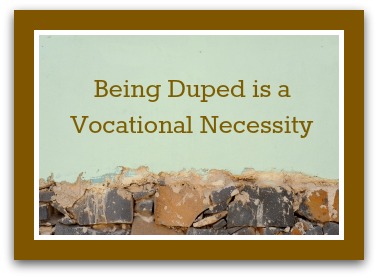 Among the prophetic books of the Old Testament, Jeremiah’s account of his vocational crisis is almost too painful to read. “You duped me, O Lord, and I let myself be duped,” he laments (Jeremiah 20:7); “you were too strong for me, and you triumphed.”
Among the prophetic books of the Old Testament, Jeremiah’s account of his vocational crisis is almost too painful to read. “You duped me, O Lord, and I let myself be duped,” he laments (Jeremiah 20:7); “you were too strong for me, and you triumphed.”
Some years back I heard these words read on a Sunday morning by a budding young lector who delivered the whole passage without a hitch. A voice smooth as glass, I thought, young and untried and clueless as to what mature relationship with the Lord God really demands. I sat there in silence, feeling cheated, knowing that these were not just ordinary words on a page.
However, I have spent decades—decades, I tell you—similarly clueless, mistakenly believing that I could be Catholic and still slide through life without too much inconvenience.
But baptized as we are into the crucified and risen Lord, we find ourselves in inescapable relationship with the One who is too strong for us, too strong for our hesitations and self-doubts and resistances. Not only will this relationship inconvenience us. It will radically reshape our understanding of who we are in relation to God, and give direction and depth and real vitality to the baptized life we live.
What does this mean, to be “duped”? It means to be tricked or fooled, lured into believing that perhaps things will remain forever the way we imagine them. In reality, we do a good job of duping ourselves. It is tempting to ignore the invitation to the one life which has our name on it. Jeremiah admits his part in his own relationship with God: “I let myself be duped.” Like Jeremiah, deep down we also know that authentic life is much more than “not being inconvenienced.” Baptized and confirmed in the prophetic role of Christian life, every one of us will wrestle with the challenge and demands of our calling.
Letting myself be duped is like living with a small and troublesome crack in my wall of defense through which the light of vocational possibility can pour through. A small beam of possibility, for sure, but divine possibility nonetheless.
As that small crack widens and my wall of defense weakens, mature relationship with the Lord begins to grow, even if in fits and starts. Jeremiah gives us a glimpse into his own stubborn vocational resistances: “I say to myself, I will not mention him, I will speak in his name no more. / But then it becomes like fire burning in my heart, imprisoned in my bones; / I grow weary holding it in, I cannot endure it” (v. 9).
When our own “inner Jeremiah” begins to wake up and become responsible for this one relationship which is beyond all others, something changes. Our defenses, our self-doubts, our resistances begin to crumble and fall away. We are not so much duped into believing something foolish. Rather, we are invited into a way of being, at last, vocationally alive. “What are you willing to put on the line?” the Lord God seems to ask. Your notion of security? Your need for safety? Your insistence that following the Lord not inconvenience you too much?
Vocationally we are confronted with the question: “Are you willing to feel holy fire burning in your heart, consuming you with divine fervor down to your bones and the marrow of your bones?”
More recently I heard this same account of Jeremiah’s vocational crisis proclaimed by a white-haired elder whose life has been broken open with tragedy, loss, and now with an impassioned commitment to serving the poor. “You duped me, O Lord,” I heard that cracked but still resonant voice proclaim in wonder, “and I let myself be duped.”
What we beheld was one of our own, standing before us, revealing the near-blinding beauty of one who has been willingly vocationally duped. We must commit ourselves to do likewise.
Copyright 2013 Mary Sharon Moore, M.T.S.
About the Author

Guest
We welcome guest contributors who graciously volunteer their writing for our readers. Please support our guest writers by visiting their sites, purchasing their work, and leaving comments to thank them for sharing their gifts here on CatholicMom.com. To inquire about serving as a guest contributor, contact editor@CatholicMom.com.


.png?width=1806&height=731&name=CatholicMom_hcfm_logo1_pos_871c_2728c%20(002).png)
Comments